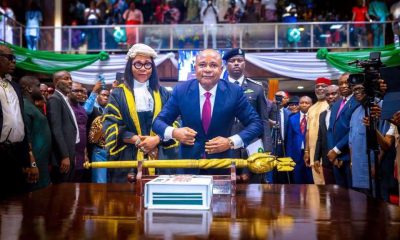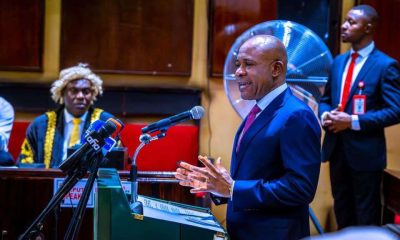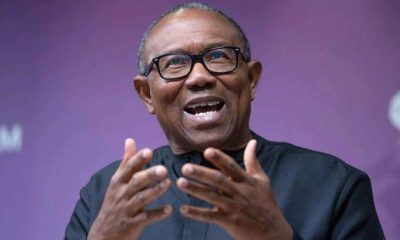Business
Gov. Mbah at Halftime: Pursuing big ideas in governance
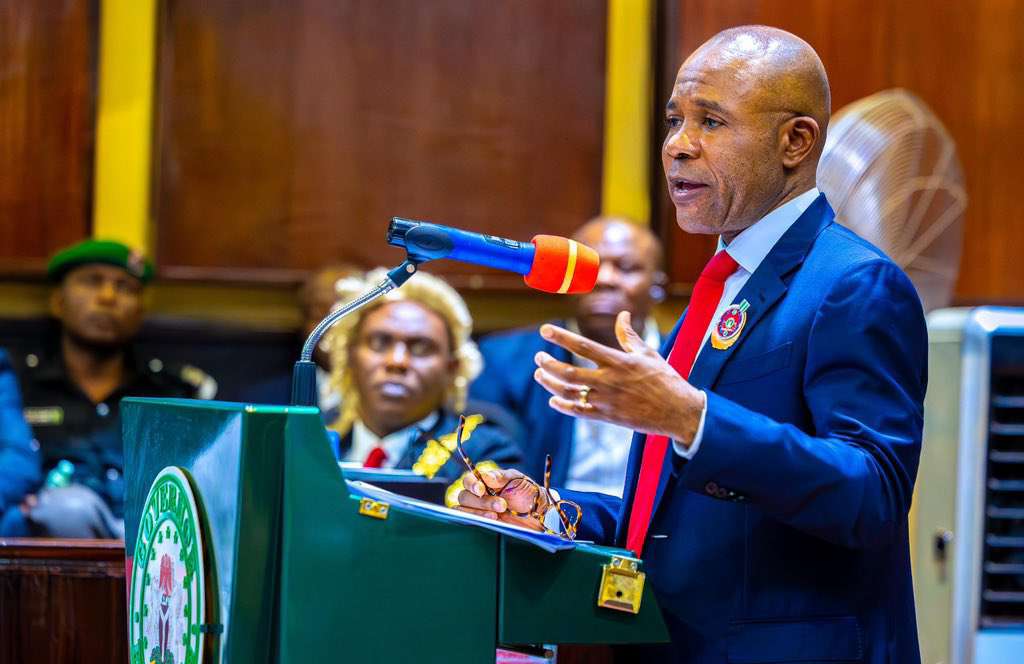
Mr. Peter Mbah, the governor of Enugu State, on May 29, officially marks his second anniversary in office. By many accounts, it has been an eventful two years for a governor, who came to power following a bitterly contested election against his Labour Party opponent, Chijioke Edeoga.
Edeoga has since rejoined the PDP, even as the election and its controversies have long faded into the distance. Enugu people have fully accepted their governor, who came on board with the famous ‘Tomorrow is Here’ slogan, and have braced for life under his stewardship. The only mention of Edeoga is in the context of what could have been if he had successfully propelled the Labour Party wave to power in 2023.
“If you look at Edeoga as a person, there’s no reason to believe he’d have offered much in terms of governance,” said Uche Ugwu, an employee of one of the federal agencies in the state. “It would have been more like what we saw under Ugwuanyi, which was a period of setback for the state. It’s good he’s run back to PDP and won’t be contesting again in 2027.”
A Change of Approach
Unlike his predecessor, Ifeanyi Ugwuanyi, who was often accused of blurring the lines between politics and governance by allocating significant state resources to appease “stakeholders,” and hosting endless solidarity visits, Gov. Mbah has charted a markedly different path — one rooted in professionalism and performance.
“Mbah shunned the old practice of patronage politics,” said a senior member of the PDP, who requested anonymity. “After his inauguration, loyalists were waiting for the usual party fanfare to begin. But to everyone’s surprise, he told us to return to our offices — that work had begun.”
This no-nonsense approach has unsettled many career politicians in the state. Rather than indulging in endless courtesy calls and ceremonial visits, the governor has limited access to political actors. Most patronage-seekers now speak to him via Zoom — sessions that are strictly timed and automatically cut off once the allotted minutes expire.
“One thing I admire about Mbah is how he has quietly retired Enugu’s so-called political stakeholders,” said Nnamdi Nnaji, a resident of Amechi, a community on the outskirts of Uwani. “I heard he told them bluntly that his contract is with the people of Enugu, not with power brokers. They’re upset because they’re no longer getting government money or attention.”
His stance may have earned him political enemies, but to many residents, it’s a breath of fresh air — a clear sign that Enugu is moving from politics as usual to governance with purpose.
Walking through the streets of the capital city and interacting with residents as part of a project to assess Gov. Mbah’s performance thus far, it is obvious that many are impressed. Much of the roads within the metropolis have been rebuilt.
Status of Promises
Although, the governor has not quite fully fulfilled the promise to bring pipe-borne water to the entire metropolis—Enugu being a city on a hill with coal underneath the soil, and therefore not where individuals could dig their own boreholes—visible efforts have been made in this regard.
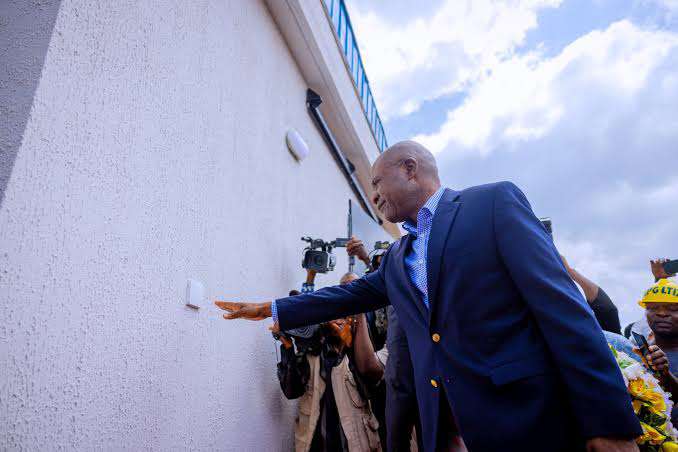
Gov Mbah inaugurating the Oji River water scheme
“Yes, water was a major challenge before this administration. At the time Governor Mbah assumed office, Enugu’s daily water production was less than 2 million litres, whereas the city needs about 80 million litres per day. In his first 180 days, as he promised, the production capacity was ramped up to 120 million litres per day. As of today, Enugu can produce that amount,” explained Dan Nwomeh, special assistant to the governor on media.
“So this is the challenge: excavating all the old asbestos pipes—many of them over 70 to 80 years old—and replacing them with what is known as ductile iron pipes, which have a lifespan of over 100 years. That’s the major hurdle. The government has successfully extended water to many areas that previously had old connections. But remember, there are also areas that never had water connections at all.”
Nwomeh said, at the moment, areas like Abakpa, Trans Ekulu, GRA, Independence Layout, parts of Uwani, and Idaw River have access to running water, but admits that it’s a work in progress.
As part of activities to mark his first year in office last year, Mbah commissioned 71 street roads in Enugu city and announced that work had begun on 80 more roads, while assuring that the 260 wards in the state will also get 10 km of road each.
Speaking at Mount Street/Umuchu Road junction, Idaw River, where he performed the commissioning of Idaw River, Uwani, and Coal Camp Zones, Mbah had said the government had a policy to ensure that all Trunk A and Trunk B roads in the urban and rural areas were paved, while noting that he’s in government to serve the people by providing basic amenities.
One year on, he has largely kept that promise, while also initiating transformational projects in the transport sector.
“In the first phase within the Enugu metropolis, the governor completed 91 roads and streets last year. As I speak to you now, 141 more roads in Enugu City have been awarded,” said Nwomeh.
“These cut across all parts of the city—Emene, where you have the airport and Tinkers’ Corner (all the roads there are being paved), Trans Ekulu, Abakpa, Uwani, Independence Layout, Achara Layout, Garki, Maryland—everywhere.”
Asked about the rural areas, Nwomeh said 20 inter-town and inter-local government roads have been awarded, which does not include major projects like the dualization of the 43-kilometre Pinox-Enugu through Ugwuogo Nike to Opi-Nsukka Road.
“That dualization is currently ongoing. Another major project is the dualization from the airport flyover to the Ebonyi State border, which is about 21 kilometres.”
Critics Disagree
But critics say the governor started so many road projects in these areas that the pace of work is slow, and while the rains have started to come, a lot of the roads remain uncompleted.
“There’s no doubt that Mbah is doing well,” said JohnPaul Eze, who recently relocated to Emene, an outskirt of the capital city, from Lagos. “But he is also yet to deliver on water. He started too many street roads at the same time, and major roads like the Opi-Ugwogo Nike road dualization, which justify internal revenue. Nearly completed motor parks at Holy Ghost, Nsukka, and Gariki. It’s fine security-wise. I’m enjoying a peaceful environment devoid of area boys at Emene. Schools are in session and health institutions are not complaining.”
Education Reforms: More Projects
The Mbah administration has made headlines for its bold initiatives, one being in education, to which the government has dedicated 33 percent of budgetary allocation for two successive fiscal years.
The administration is constructing 260 smart schools across the 260 electoral wards in the state. It is also building eight new science, clinical, and vocational colleges, while some dilapidated institutions, like the flagship Government Technical College, Enugu, were completely demolished because they were in a state of total decay, and are currently being rebuilt.
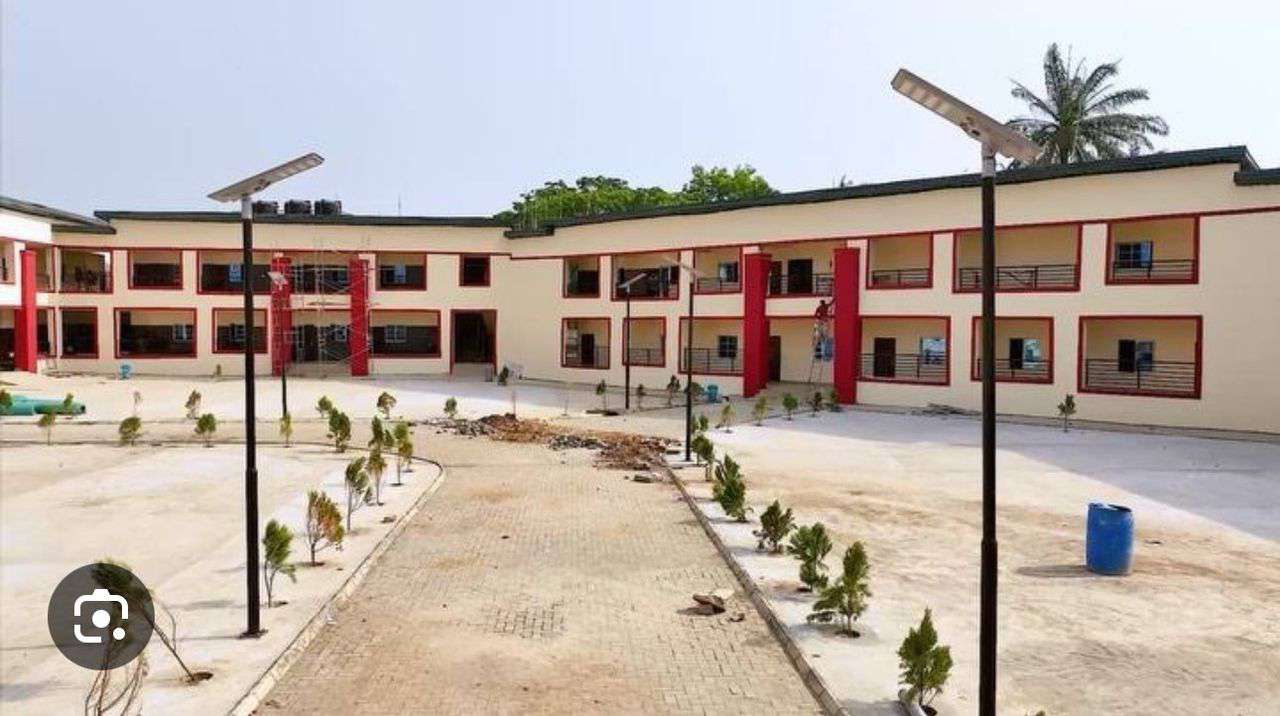
Owo Smart school, one of the ones completed by the administration
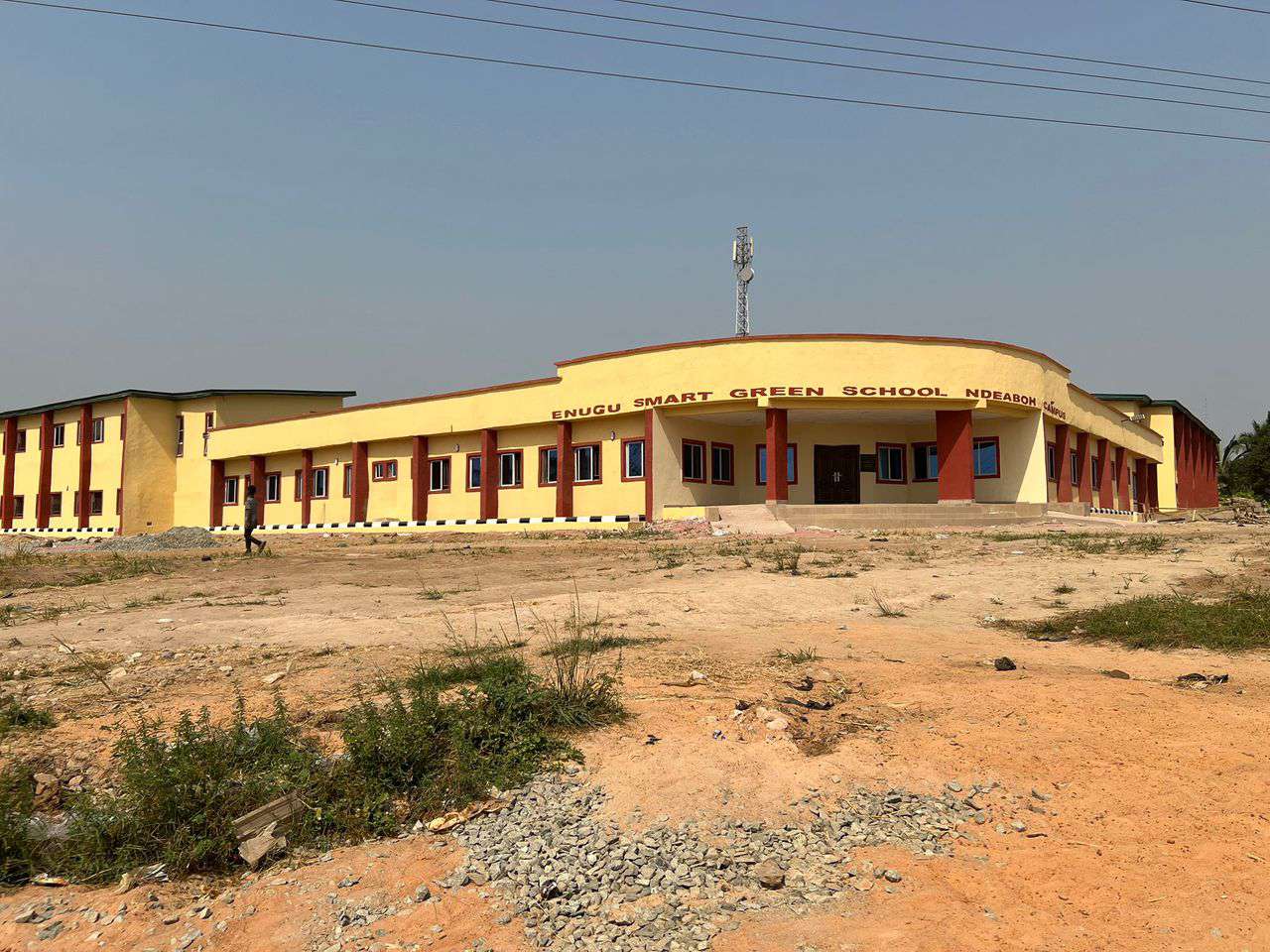
Additionally, the government is constructing 17 smart secondary schools—one in each of the 17 local government areas of the state.
“It’s a complete overhaul of the state’s educational system. We’re moving away from old, dilapidated primary schools. The plan is to enroll nearly 300,000 out-of-school children in the new smart schools,” said Nwomeh.
“The goal is to ensure that our children can compete with their peers anywhere in the world. These smart schools are equipped with interactive digital boards connected to the internet, including Google and YouTube. We are no longer focusing on rote learning. Every student will experience practical demonstrations of lessons.”
Healthcare
In the area of healthcare, the administration is constructing 260 type-2 primary healthcare centres across the state, ensuring that every ward gets a health facility. Up to 100 of these have already been completed, according to the government spokesperson. Meanwhile, at the secondary level, general hospitals in local government headquarters are being revamped.
At the tertiary level, the state is constructing the Enugu International Hospital, a 300-bed facility targeting the medical tourism market.
“The hospital will be a quaternary facility offering specialized medical services, and we are planning to partner with diaspora-based Nigerian medical professionals to run it.”
But it has not been all smooth sailing. A number of the projects, like the smart schools, have been stalled over time, with contractors disappearing from project sites. Nwomeh said the state government is actively addressing the situation, which he blamed on some underperforming contractors, who have been disengaged, while assuring that the projects have been re-awarded to more competent contractors.
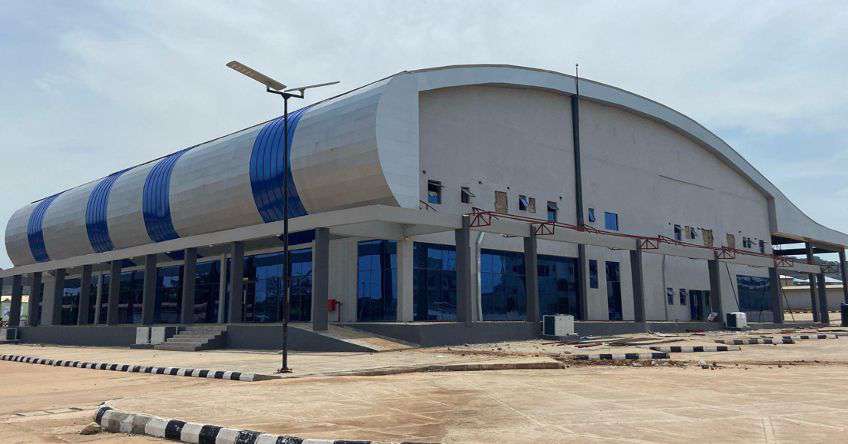
Ogbete Bus Terminal 1
“Mbah is a man of big ideas,” said Francis Ezugwu, a lawyer based in the state capital. “He’s pushing the limits of what people believed was achievable as a state government. Sometimes, you can’t help but imagine what Enugu would have looked like if someone like him succeeded Sullivan Chime, and not Ugwuanyi.”
Transport Sector Overhaul
Perhaps, in no sector has Mbah’s government’s bold ideas found more expression than in transport, where there’s a plan to construct a 135.5-kilometre standard gauge rail line that will connect major South-East cities to the Onne Port in Rivers State.
This is in addition to a state-owned airline, Enugu Air, and the CNG-powered mass transit buses—all of which are to be launched as part of activities to mark the second anniversary this May.
“The core objective of Gov. Mbah’s administration in the transport and logistics sector is to use it as a catalyst for economic growth,” said Iphie Ugonabo, special assistant to the governor on transport.
“Transport is a key enabler of development. His Excellency is being very intentional. Growing an economy in today’s world requires doing things differently. That’s why you’re seeing these bold projects.”
Ugonabo said the administration is building a model transport system, including massive road projects through the Ministry of Works, and supporting infrastructure, such as the bus terminal projects.
“We are set to commission five ultra-modern terminals this May. Two are at Holy Ghost: Terminal 1 for interstate travel and Terminal 2 for intracity movement, including our BRT and other city buses. The Holy Ghost terminal is our flagship. It sits on about 13 hectares and is designed to handle high traffic volumes, hence the attention to detail,” she said.
“We also have terminals in Nsukka, Gariki and Abakpa. The idea is to bring order and efficiency to the transport system. His Excellency has envisioned a world-class interchange that doesn’t just function as a passenger transfer/loading point, but one that promotes efficiency in transport operations, safety & order, improves urban mobility, integrates a smart Infrastructure and serves as an economic activity hub.
“That is the reason for the inclusion of retail outlets, banks, restaurants, cinemas, and motels. The idea is that if travellers arrive at night, they can rest, eat, and even shop — all in one secure space. It’s a one-stop hub for transport and ancillary services. We’ve also incorporated CNG filling stations since our buses run on compressed natural gas.”
Stable Power
Mbah has already signed into law the Enugu State Electricity Law 2023, enabling the establishment of the Enugu Electricity Market, in line with the Electricity Act 2023. The law is expected to attract independent power providers and ensure stable electricity, especially to industrial clusters and the proposed smart schools and hospitals.
To support this, the administration has signed multiple MoUs with private investors to build Independent Power Projects (IPPs). “We have signed about five MoUs with private investors to build IPPs,” Nwomeh noted. “The plan is to provide dedicated power to key infrastructure—smart schools, healthcare facilities, transport interchanges, etc.—so they are not dependent on the national grid.”
Branding and Business Reforms
The Mbah administration has also rolled out an aggressive state branding and investment drive under the “Enugu State is Ready for Business” campaign. Key to this is the Ease of Doing Business initiative, which earned the state recognition from the Presidential Enabling Business Environment Council (PEBEC) in 2023 as one of the top three reforming states.
Under this initiative, a Business Enabling Environment Secretariat was set up in the Office of the Governor. The state has also digitized the issuance of Certificates of Occupancy (e-C of O), making Enugu one of the few states in the country, where property titles can be obtained in less than 72 hours.
In addition, the Enugu State Geographic Information Service (ENGIS) is now fully operational and serving as the main driver of land administration reforms.
The government has also concluded the Enugu State Economic Transformation Programme (EETP), with support from the World Bank, to overhaul the state’s institutional and regulatory framework, targeting improvements in land administration, public financial management, and infrastructure delivery.
“There is also the soon-to-be-launched Enugu SME Financing Programme, designed to provide affordable credit and capacity building to small businesses across the state,” Nwomeh revealed.
The government is simultaneously developing industrial parks in the three senatorial zones of the state. At the heart of this is the 2,000-hectare Industrial and Innovation Park at the site of the moribund United Palm Products Ltd (UPPL) in Nkanu West LGA. The park is expected to host agro-allied processing plants, an ICT hub, research facilities, and logistics platforms. It will also feature a residential area and social amenities for workers.
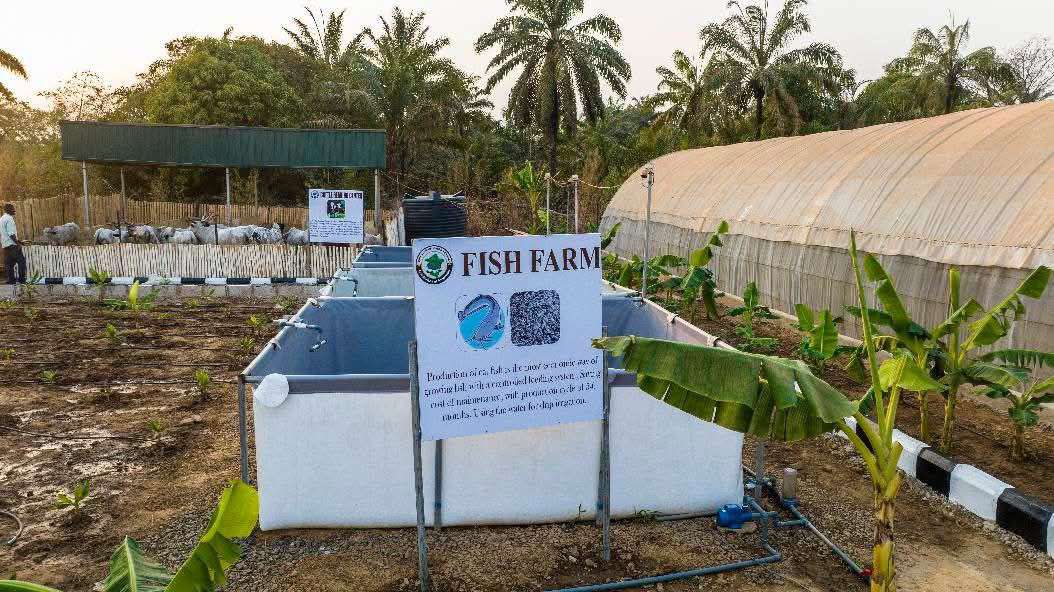
The smart schools also incorporate Smart Green School Farm, an initiative aimed at equipping school children with practical and subsistence agricultural production that will in turn generate products to be feeding the school children on every school days.
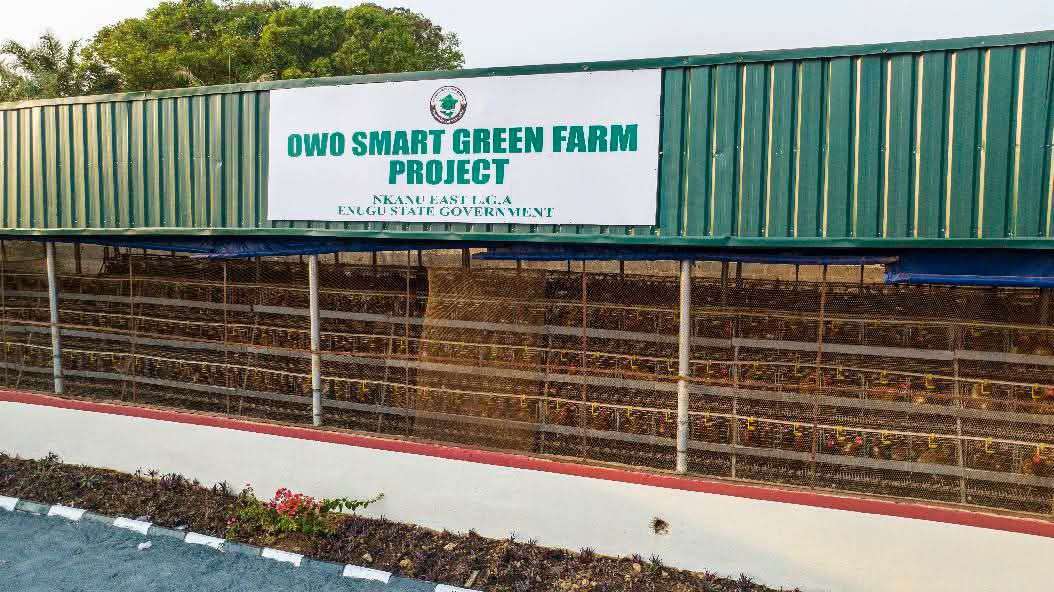
“We already have several expressions of interest from companies looking to relocate their factories to Enugu,” said Nwomeh. “Our strategic location in the South-East and the infrastructure investments we’re making are major selling points.”
ICT and Tourism
Gov. Mbah is equally pushing to build a robust digital economy. Fortnight ago, the state organized a well attended Tech Festival, tagged “From coal to Code,’ with the governor assuring that his administration will “continue to invest in technology, ensuring that our young people are equipped to become the wealth creators and workforce leaders of tomorrow.”
To boost the tourism sector, the state is building a 5-star hotel beside the new International Conference Center, which has a seating capacity of 5,500. The two projects were indeed central to the choice of Enugu as the host this year’s Nigerian Bar Association Conference billed for August.
The administration is also rebuilding the long abandoned Enugu Hotel Presidential, while revitalizing some long-abandoned parks in the city, alongside many other tourist sites, as part of its effort to “attract three million visitors to Enugu annually.”
Commissioner for Culture and Tourism, Dame Ugochi Madueke, announced recently that the government has approved phased investments into tourism development. The first phase includes the transformation of major tourist sites, such as Awhum Waterfall, Ngwo Pine Forest, Nsude Pyramid, Okpatu Hill (for the Cross of Hope project), Akwuke/Atakwu Waterpark, and Ovu Lake Golf & Resort at Akpawfu.
She revealed that Nigeria’s longest canopy walkway (600m) will be built at Nsude Pyramid and a 300m zipline at Ngwo Pine Forest — the first of its kind in the country. The 50-metre Cross of Hope monument will stand atop the Okpatu Hills, reaching a height of 630 metres above sea level and featuring 15 floors and an elevator.
On Youth and Sports Development, Barr. Lloyd Ekweremadu, the commissioner, announced total upgrade of Nnamdi Azikiwe Stadium, while Awgu Games Village will commence in June in preparation for the 2026 National Sports Festival (Coal City Games), which Enugu is set to host.
He also announced the completion of an animation laboratory for youth skill development, to be commissioned soon, and the empowerment of over 2,100 youths trained last December, scheduled for August 12, International Youth Day.
Internally Generated Revenue (IGR)
To finance the ambitious infrastructure and development projects across Enugu State, the Mbah administration has launched an aggressive campaign to broaden its Internally Generated Revenue (IGR). The strategy includes automating revenue collection, expanding the tax net to capture the informal sector, plugging leakages, and eliminating multiple taxation.
“Keke riders pay N700 daily. Every household pays the ESWAMA levy. Each room is charged N1,200 monthly. But no one comes to collect your waste — you still pack it yourself,” said a lecturer at the Institute of Management and Technology (IMT), who asked not to be named. “You can’t avoid payment. If you try to be polite, they send educated agents. If you resist, they send touts.”
Within the metropolis, shop owners pay N36,000 annually. The administration has redefined the boundaries of the Enugu metropolis to include Enugu East, Enugu South, Udi, Nsukka, and parts of Awgu. A development levy has also been introduced, alongside a proposed land use charge for buildings within these areas. The development fee for a bungalow is N200,000, while a duplex attracts N350,000. However, reports suggest that state officials sometimes collect bribes — especially in less-visible areas — accepting lower amounts without issuing receipts.
Additionally, traffic enforcement cadets under the “MOT” unit reportedly charge as much as N20,000 for wrong parking.
Despite the outcry, the reforms have significantly improved state finances. With leakages blocked and a wider tax net, Enugu’s IGR has surged from N30 billion to over N500 billion annually — a staggering 1,000 percent increase.
“As a governor, I’m often asked how we achieved a 1,000 percent revenue increase — from N30bn to over N500bn. The answer is simple: we prioritized financial inclusion,” Mbah said during the inauguration of the Presidential Committee on Economic Reform and Financial Inclusion at the State House. “Our administration did not raise tax rates. Instead, we expanded the tax net by ensuring more people participated in the financial system.”
Still, many disagree with the governor’s assertion. The new tax regime has triggered considerable resentment, especially among traders and small business owners.
“What is called a tax in Enugu State has become extortion,” said Mr. Ugoh Agballah, chairman of the All Progressives Congress (APC) in the state. “It ranges from land rent, property tax, sales tax, income tax, rates and levies.”
But Mbah’s media aide, Nwomeh, insists the backlash is misguided. “Our people need to understand that no developed country runs without taxes. None,” he said. “We’re trying to instill a culture of tax compliance. We can’t continue relying on Abuja for funding. I’ve been on radio, I’ve had conversations on the streets — and even critics admit they’re seeing results.”
Security and Public Safety
Enugu has in recent times made national headlines over incidents of kidnappings and attacks attributed to armed herders. However, the security situation appears to have improved significantly under Gov. Mbah’s administration.
One of the key interventions is the establishment of the Distress Response Squad (DRS) — a specialized elite police unit equipped with advanced surveillance tools and tactical gear. The unit is tasked with responding rapidly to criminal activities, particularly kidnappings, armed robbery, and other violent crimes.
According to Nwomeh, the DRS has already recorded major breakthroughs in dismantling criminal syndicates operating within the state.
To complement the DRS, the state has also completed the first phase of a new Emergency Communication Centre (ECC). The facility integrates emergency response agencies and offers a real-time incident management platform designed to improve coordination and efficiency in crisis situations.
In a further move to boost funding for security operations, Gov. Mbah signed into law the Enugu State Security Trust Fund, which is expected to attract private sector contributions toward the procurement of equipment, logistics, and support for security personnel.
Nwomeh pushed back against reports that suggest a worsening of insecurity in the state. “A lot of the news you see out there is fake,” he said. “There was a recent report about the alleged killing of 25 people in Uzo Uwani, but it turned out to be false — no evidence was provided to back the claim.”
He also credited the Mbah administration with restoring public order by ending the once-pervasive Monday sit-at-home directive imposed by non-state actors. “Before this administration came into office, government offices were shut on Mondays. Schools didn’t open. Banks were closed. Even shopping malls remained locked. It was this administration that ended that menace.”
Public Perception and Challenges
Despite the ambitious agenda and ongoing projects, there have been murmurs of discontent from some quarters—mostly over delays in project delivery, increased taxation, and the state’s debt profile.
“It’s not all rosy,” said Emeka Asogwa, a trader at Ogbete. “Yes, the government is doing things we can see. But the cost of living is still high, and they’ve increased taxes. Small businesses are struggling.”
However, others believe the trade-offs are worth it.
“Mbah is not just building roads; he’s building a future for our children,” said Ifeoma Eze, a school teacher. “We’ve had governors, who just shared rice and wrappers. It’s time for something more meaningful.”
A New Eastern Star?
Some observers have likened Mbah’s developmental vision to that of the legendary Dr. Michael Okpara, who governed the old Eastern Region from 1959 to 1966 and led the region to become the fastest-growing economy in world at the time.
“Of course, Mbah is not Okpara,” said political analyst, Chuka Okoye. “But there are parallels in their approaches—bold ideas, rural industrialisation, focus on education and health. If Mbah stays the course, Enugu may well become the new star of the East.”
As the governor enters his third year in office, expectations remain high. His administration has set a high bar. The challenge now is sustaining momentum and delivering on the many promises.



